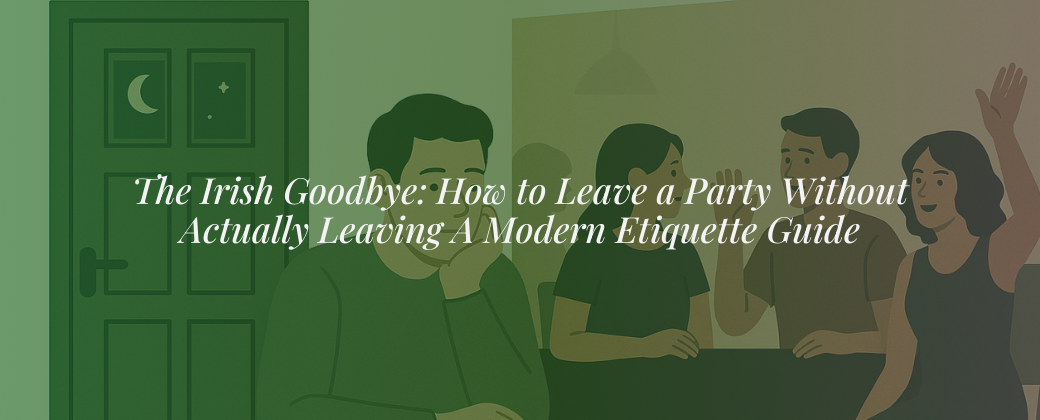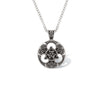The Irish Goodbye: How to Leave a Party Without Actually Leaving, A Modern Etiquette Guide

Let’s face it, not everyone is built for the drawn-out round of hugs, handshakes, and awkward small talk that comes with saying goodbye at a party. If you’ve ever wanted to dodge that entire routine and vanish like a social ninja, welcome to the world of the Irish Goodbye.
Whether you’re an introvert, an early bird, or just someone who hates dragging out the end of the night, this blog will walk you through everything you need to know about leaving a party without actually... leaving. Or at least without announcing it to the room.
What Exactly Is an Irish Goodbye?
The Irish Goodbye is the act of leaving a social event without telling anyone you’re going. No “see you laters,” no “thanks for having me,” not even a wave from across the room. You just slip out quietly and head home.
Some folks swear by it, while others see it as a total faux pas. But love it or hate it, it’s definitely part of modern social behavior.
A Bit of History
Surprisingly, the term "Irish Goodbye" doesn't actually come from Ireland, and in fact, some find the phrase culturally insensitive. It likely stems from old stereotypes in the 19th century but has since evolved in casual usage. These days, it’s less about nationality and more about a disappearing act done with finesse.
"You don’t have to make a scene to make an exit."
Why Do People Do It?
So what’s the deal? Why leave without saying goodbye? Turns out, there are some solid reasons behind the ghost move:
-
Avoiding long goodbyes: Saying goodbye can take forever, especially if you know a lot of people.
-
Social anxiety: For introverts or those with anxiety, goodbyes can feel overwhelming.
-
Keeping the mood: Sometimes it feels better to leave on a high note, rather than wind down into awkwardness.
-
It's late and you're tired: Enough said.
When Is It Okay to Pull an Irish Goodbye?
Alright, there is some etiquette involved. Here are times when it’s more acceptable to make your silent exit:
-
Large parties or bars where people are mingling and you won’t be missed immediately
-
Work functions where staying too long might actually get awkward
-
Events where the host is busy or distracted, and saying goodbye would disrupt the flow
On the flip side, it’s better to say goodbye in these situations:
-
Small gatherings of close friends
-
Family events
-
Dinner parties with fewer than 10 people
-
When the host specifically asked you to let them know
How to Do It Right
If you’re going to ghost, ghost gracefully. Here’s how to do it without burning social bridges:
1. Let someone know quietly (optional)
If you feel the need, shoot a quick text to the host later like “Had a great time, didn’t want to interrupt thanks so much!”
2. Leave your stuff prepared
Don’t scramble for your coat or phone charger last minute. That’ll only draw attention.
3. Skip the emotional guilt
You're not being rude you're just choosing an efficient exit. No shame in that.
4. Make it normal
If you make Irish Goodbyes your usual exit style, friends will come to expect and accept it.
Real Talk: Is It Rude?
It depends. In some cultures or family traditions, it might seem disrespectful. In others, it’s totally chill.
Ultimately, it’s about knowing your audience. At a big party, no one’s tracking your every move. At your cousin’s wedding reception? Yeah, maybe don’t disappear on Grandma.
Irish Goodbye vs French Exit: Are They the Same?
Funny enough, yes. The term “French Exit” is basically the same idea leaving without farewells. Different names, same vanishing act.
Depending on where you’re from, you might hear one more than the other. Either way, you're ghosting with style.
Should You Feel Guilty?
Let’s not overthink it. If the vibe is casual, the crowd is big, and you’re ready to bounce, then bounce. A quick follow-up text or message the next day shows you care without the need for a dramatic exit.
At the end of the day, your energy is precious. If leaving without goodbyes helps you preserve it, that’s a win.

Alternatives to “Goodbye”
If you’re not quite ready to ghost but still want a low-key exit, try these:
-
“Gotta run, catch you soon!”
-
“Slipping out now, thanks again!”
-
“Leaving the scene like a ninja bye!”
Final Thoughts
The Irish Goodbye isn’t about disrespect it’s about reading the room, knowing yourself, and making an exit that fits the moment. Whether you’re sliding out of a rager or skipping the emotional goodbyes at a networking event, sometimes vanishing into the night is exactly what the moment calls for.
Just don’t forget your keys.
FAQs
Q: Is it really rude to leave without saying goodbye?
A: Not always. In big gatherings, it’s often perfectly fine. In small or formal settings, a quick goodbye is more respectful.
Q: Why is it called an Irish Goodbye?
A: The term likely comes from old stereotypes but is now used informally to describe a stealthy party exit.
Q: Can I use an Irish Goodbye at work events?
A: Depends on the culture. In casual environments, sure. In more formal or networking-heavy spaces, it might come off as careless.
Q: What’s a good way to follow up if I do an Irish Goodbye?
A: A short thank-you text or message the next day keeps things friendly and thoughtful.







